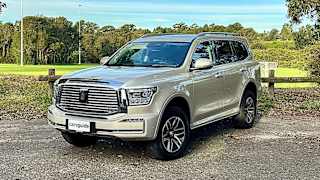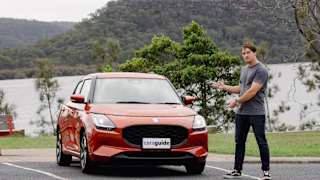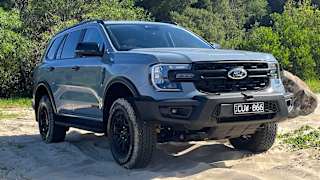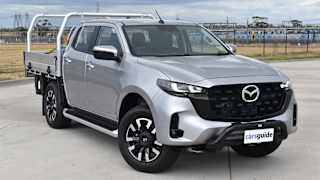A plug-in hybrid (PHEV) version of the BYD Sealion 7 has debuted in China featuring the brand’s latest self-driving system and a vehicle-mounted drone hangar.
Showcased alongside Denza and Fang Cheng Bao SUVs as part of a collaboration with Chinese drone-maker DJI, it’s the first time we’ve seen a PHEV version of the Sealion 7, which arrived in Australia this month in electric-only guise.
CarNewsChina reported that the PHEV variant carries a 1.5-litre turbo-petrol engine and dual electric motors. Maximum power on the petrol motor is 115kW, while it is 200kW on the front electric motor and 150kW at the rear.
Each electric motor is powered by a 26.6kWh Blade battery pack, which delivers a claimed 120km of electric range under the more lenient CLTC cycle, while fuel consumption is claimed at between 5.5- and 6.6-litres per 100km once the battery is fully drained.
Its slightly smaller Sealion 6 sibling, which is already on sale in Australia, boasts a similar configuration, albeit with less power. That includes an 18.3kWh battery pack, two electric motors on the front and rear axle that deliver 150kW and 120kW, respectively, and a 96kW 1.5-litre turbo-petrol motor.
Electric driving range is rated at 81km on the Sealion 6 under the WLTP cycle.

Seeing how closely related both five-seat SUV models are, it seems unlikely that BYD would release the Sealion 7 PHEV in Australia. That said, after David Smitherman, CEO of the brand’s local distributor, EVDirect, told CarsGuide nothing was off the table earlier this year, it remains a possibility.
“Everything is on the agenda [for Australia],” Smitherman told CarsGuide.
“There’s a substantial amount of product to come, in both EV and PHEV.”

CarsGuide has contacted BYD’s local operations to determine if the Sealion 7 PHEV is under consideration for Australia. An update to the article will follow with a response.
In addition to the new powertrain, the Sealion 7 features some unique design updates, including a LED light strip that spans the full width of the bonnet and a modified front fascia with larger air intakes to accommodate its petrol motor.
There’s also a modified rear apron, LED taillight bar and different alloy wheel designs. Not to mention the huge rooftop-mounted Lidar sensor that pairs itself with the car's safety cameras to inform the brand's new ‘God’s Eye’ self-driving technology.
Compared to a standard level two system, which can only operate on highways, the God’s Eye system can reportedly navigate traffic lights, obstacles and overtake in urban settings. It remains offline in Australia, though.
Curiously, the Sealion 7 has also been fitted with a rooftop-mounted drone, an accessory which will only be made available to customers in China for now.
According to CarNewsChina, the mobile drone hangar allows 4K recording vision to be transmitted back to the car. The drone can follow the vehicle at a maximum speed of 54km/h.
Pricing in China is expected to be between CNY200,000 to CNY250,000 ($44,000 to $55,230) with the drone attachment and autonomous driving capabilities fitted.












.jpg)
.jpg)


.jpg)








.jpg)

.jpg)
.jpg)